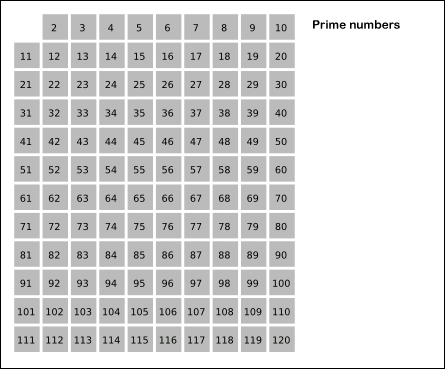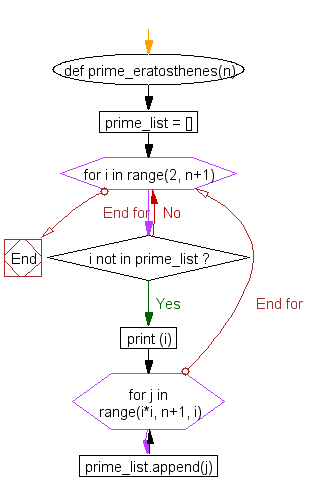Python: Sieve of Eratosthenes method, for computing prime number
Compute Primes Using Sieve of Eratosthenes
Write a Python program that uses the Sieve of Eratosthenes method to compute prime numbers up to a specified number.
Note: In mathematics, the sieve of Eratosthenes (Ancient Greek: κόσκινον Ἐρατοσθένους, kóskinon Eratosthénous), one of a number of prime number sieves, is a simple, ancient algorithm for finding all prime numbers up to any given limit.

From Wikipedia Sieve of Eratosthenes: algorithm steps for primes below 121 (including optimization of starting from prime's square).
Sample Solution:
Python Code:
# Define a function named 'prime_eratosthenes' that generates prime numbers using the Sieve of Eratosthenes algorithm
def prime_eratosthenes(n):
prime_list = [] # Create an empty list to store prime numbers
# Iterate through the numbers from 2 to 'n'
for i in range(2, n+1):
if i not in prime_list:
# If 'i' is not in the 'prime_list,' it's a prime number; print it
print(i)
# Mark all multiples of 'i' as non-prime by adding them to 'prime_list'
for j in range(i*i, n+1, i):
prime_list.append(j)
# Call the 'prime_eratosthenes' function with 'n' set to 100 to generate prime numbers
# The function does not have a return value, so it prints the prime numbers directly
prime_eratosthenes(100)
Sample Output:
2 3 5 7 11 ------- 79 83 89 97 None
Flowchart:

For more Practice: Solve these Related Problems:
- Write a Python program to find all prime numbers in a given range without using the Sieve of Eratosthenes.
- Write a Python program to generate prime numbers up to n using a segmented sieve.
- Write a Python program to compute the prime factors of a given number using the sieve method.
- Write a Python program to count the number of prime numbers in a given list using the sieve method.
Go to:
Previous: Write a Python program to generate all sublists of a list.
Next: Write a Python program to create a list by concatenating a given list which range goes from 1 to n.
Python Code Editor:
What is the difficulty level of this exercise?
Test your Programming skills with w3resource's quiz.
